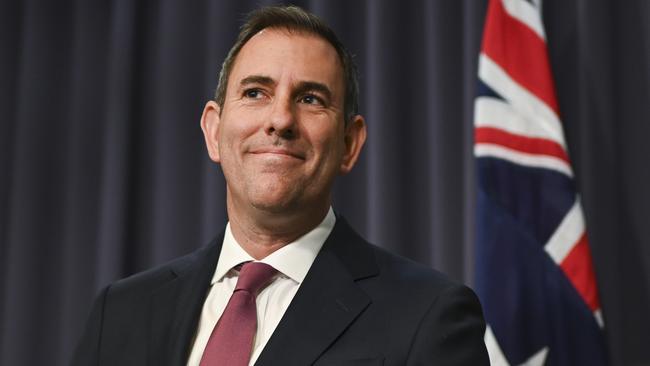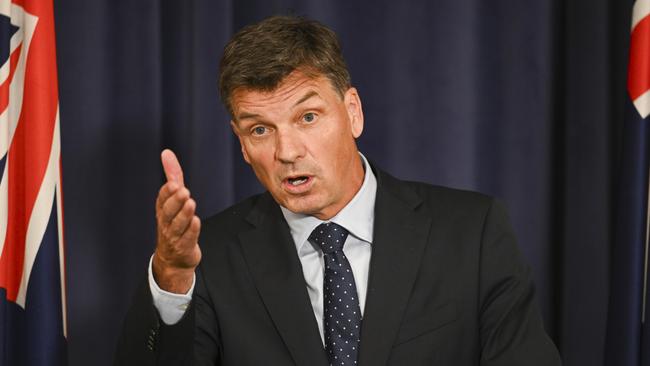Labor’s $22bn budget blowout as it struggles to keep power bills saving promise
Labor is clinging to the delusion it can avoid breaking an election promise to deliver $275 in power bill savings, as the federal government reveals a nearly $22bn budget blowout.
National
Don't miss out on the headlines from National. Followed categories will be added to My News.
Labor is clinging to the delusion it can avoid breaking an election promise to deliver $275 in power bill savings compared to three years ago, as the federal government reveals an almost $22bn budget blowout.
The Mid-Year Economic and Fiscal Outlook (MYEFO) released on Wednesday also confirmed the country is on track to hit the historic record of $1 trillion in gross debt by 2025-26.
Economists have warned significant reforms are required to fix the structural problems in the budget, which is currently forecast to remain in deficit for the next ten years.
As cost of living pressures continue, Treasurer Jim Chalmers would not say if he believed Labor had run out of time to deliver on its pledge to lower the average household bill by 18 per cent – or $275 – on 2021 levels by 2025, instead pointing out: “it’s 2024 now”.
Asked what his answer would be in two weeks time when the new year begins, Mr Chalmers said the latest inflation figures showed power costs were down 35.6 per cent in the latest inflation figures thanks in large part to a $300 subsidy for every household.
But compared to 2021 power prices, the average typical Australian household is still paying between $148 and $787 more this financial year, meaning energy retailers would have to slash about $423 to $1062 for Labor to reach its promise.

Coalition climate change and energy spokesman Ted O’Brien accused Labor of treating Australians like they were “dumb”.
But Mr Chalmers criticised the opposition for voting against two rounds of energy subsidies, and did not rule out further relief for households ahead of the election in early 2025.
“We have delivered a substantial decrease in electricity bills because we know that’s one of the big drivers of pressures on household budgets,” he said.
Asked how he would feel to be the first treasurer to oversee a trillion-dollar debt next year if Labor won the next election, Mr Chalmers said while Australia was in a better position than other countries, the figure was “still a concern”.
But he said hitting the figure a “couple of years” later had meant Australia would avoid a “mountain” of further debt.
The former Coalition government was forecast to reach $1trn gross debt by 2023-24, but Labor’s budget repair efforts have staved off this grim milestone for two years, with the $200bn improvement saving taxpayers about $70bn in interest payments over the decade.
The opposition accused Mr Chalmers of being “addicted” to spending, which was in turn driving inflation meaning interest rates would remain higher for longer.

Coalition treasury spokesman Angus Taylor said MYEFO had “absolutely no path” to a restoration of Australians’ living standards and only “red ink as far as the eye can see”.
“This is the biggest spending government we have seen out of outside of wartime or crisis,” he said.
KPMG chief economist Dr Brendan Rynne said Australia has a “spending problem” that if left unchecked would create a “ballooning deficit and expansionary debt for the next generation”.
Labor argued additional spending of about $58.3bn this financial year alone was due to “automatic” increased payments like indexation of the pension and “unavoidable” costs like ongoing subsidies of cheaper medicines and childcare.
But the combination of increased costs and less revenue driven by a drop in demand for mining exports, Australia will plunge further into the red over the next four years, with the deficits blowing out by an extra $21.8bn through to 2027-28 compared to forecasts released in the budget just six months ago.
Deloitte Access Economics partner Stephen Smith said commodity price booms had allowed governments to paper over the “cracks” in the budget and ignore the “worsening structural deficit”.
“Today’s very weak private sector economy has revealed the extent of the issue, which would be worse but for Australia’s strong labour market and rapid population growth,” he said.
The government is also earning less 24 per cent revenue than forecast in May from tax on cigarettes and tobacco as Australians turn to vaping and illegal products.
Mr Chalmers said it was a “good thing” that more people were giving it away but acknowledged that there was a compliance challenge with illegal tobacco.
The federal government will also provide $926.9m to the Infrastructure Investment Program for blowouts on existing road and rail projects nationwide over seven years, with payments expected to increase by $726.5m over the next four years.
Queensland will receive more than $504m in extra funding. More than half will be spent on seven projects along the Bruce Hwy, almost $80m to the Indooroopilly Roundabout Intersection Upgrade, $51.5m to Brisbane Metro, with a further eight projects sharing the rest.
More Coverage
Originally published as Labor’s $22bn budget blowout as it struggles to keep power bills saving promise



